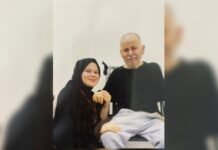Hüseyin Özen, who had previously been self-medicating for a cold, died of COVID-19 on November 14 after spending 15 days in intensive care, Bold Medya reported.
Özen, 59, had been at Bursa Prison since February 2018. He contracted COVID-19 in prison but was not hospitalized until it was too late. According to his wife Sabiha Özen the inmates did not have access to a doctor and had to self-medicate because “the prison doctor had not been on duty since the onset of the pandemic.”
In an interview with Bold Medya, Özen’s brother Ahmet Özen said his brother was in the hospital for 15 days before he passed away. “We do not have much information as to what transpired. My brother had a fever at night,” he said, “Because there was no doctor, he bought a cough syrup that was sold in the prison canteen. We were informed only when he was hospitalized.” Ahmet Özen also said there were coronavirus cases in several other wards.
Hüseyin Özen was detained three years ago on charges of alleged ties to the Gülen movement. He was sentenced to seven years, and his case was with the Supreme Court of Appeals at the time of his death. According to his brother, Özen was not released despite the fact the witness whose statement led to his conviction retracted his testimony and the public prosecutor asked for his release three times.
The Turkish government accuses the Gülen movement, a faith-based group inspired by Muslim cleric Fethullah Gülen, of masterminding a coup attempt in July 2016 and labels it a terrorist organization. The movement strongly denies involvement in the coup attempt or any terrorist activity.
A massive purge of dissidents in the aftermath of the coup attempt has filled Turkey’s prisons, which today are overcrowded with tens of thousands of political prisoners.
The Turkish parliament passed an early parole law on April 14 aimed at reducing the inmate population of the country’s overcrowded prisons due to the coronavirus pandemic. The legislation, which excludes political prisoners such as politicians, journalists, lawyers, academics and human rights defenders convicted under the country’s controversial counterterrorism laws, prompted calls from the UN and the EU for the non-discriminatory reduction of prison populations.
Although most of the seriously ill patients have forensic and medical reports deeming them unfit to remain in prison, they are not released. Authorities refuse to free them on the grounds that they pose a potential danger to society. In the first eight months of 2020 five critically ill prisoners died because they were not released in time to receive proper medical treatment.















